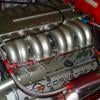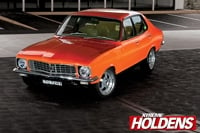Helium in Tyres
#1
 _user asked to be removed_
_user asked to be removed_
Posted 27 July 2006 - 06:11 PM
Cheers,
Liam
#2

Posted 27 July 2006 - 06:20 PM
M@
#3
 _Herne_
_Herne_
Posted 27 July 2006 - 06:31 PM
He says he will keep using it but hasn't honestly noticed that much of a difference.
Cheers
Herne
#4

Posted 27 July 2006 - 06:32 PM
Can't say I know anything about its benefits, but they had a few little adds on there stickered up promotional AU ute that I was checking out as my tyres were fitted.
#5
 _torana_
_torana_
Posted 27 July 2006 - 06:40 PM
In a street car ( wank! dont beleive the hype , air is free at servos , helium aint
#6

Posted 27 July 2006 - 06:43 PM
The air from the servo we all put in our tires has lots of moisture in it which is supposed to give a greater variance in pressure over the operating range of a tire.
It is also claimed to be better for the rubber if you use nitrogen....who knows? my tires don't last that long
M@
#7

Posted 27 July 2006 - 07:23 PM
Hehehe Funny i suffer that same problem!It is also claimed to be better for the rubber if you use nitrogen....who knows? my tires don't last that long
I am up for a new pair of rears in the next week or 2.
M@
I too think Nitrogent inflation is a wank.. Just another gimmick to get you going back for refills so they can sell you other shit you dont need!
Stick with air.. i dont think it makes ANY difference in a street application!
#8

Posted 27 July 2006 - 07:30 PM
#9
 _user asked to be removed_
_user asked to be removed_
Posted 27 July 2006 - 07:36 PM
#10

Posted 27 July 2006 - 07:38 PM
#11
 _chevy_253_torana_
_chevy_253_torana_
Posted 27 July 2006 - 07:57 PM
Can't say I know anything about its benefits, but they had a few little adds on there stickered up promotional AU ute that I was checking out as my tyres were fitted
so in other words you had to go fora p!$$ ???
#12

Posted 27 July 2006 - 08:14 PM
hahahahha
#13
 _brett_32i_
_brett_32i_
Posted 27 July 2006 - 08:33 PM
#14

Posted 27 July 2006 - 08:39 PM
I too think Nitrogent inflation is a wank.. Just another gimmick to get you going back for refills so they can sell you other shit you dont need!
Well Brett just voided that statement
Does it manage to not leak even if you rip half the wall of the tyre out? hehe
#15
 _devilsadvocate_
_devilsadvocate_
Posted 27 July 2006 - 09:00 PM
All gases will behave the same way when their temperature increases(you wont find any temperature expansion tables for gases), this is well established by the combined gas equations of Charles and Boyle��.there are no exceptions, unless at extremes of the absolute temperature scale or near the liquification conditions of the gas in use, which for nitrogen(not inert), oxygen or helium is certainly not going to be a problem��H2O�..yes.
Toranamat69 is correct, it�s the moisture(water) that is the normal compressed air mix that can cause variations in pressure according to the heat of the tyre, the changes in pressure due to vaporisation of the water . If the regular compressed air mix was dehumidified it would offer the same benefits as the nitrogen mix which is also water free, and this is in fact what some formula one teams also do.
2 gram of water making it inside the tyre will cause an increase of about 1.5psi in a torry sized tyre when vaporised and add to increasing pressure when heated, or a corresponding drop in pressure when the tyres are cold.
As for providing a nicer ride��if tyre x and tyre y both measure the same pressure , there is no logical explanation as to why one gas could feel different to another, suggest they don�t!.
I remember reading one claim that the tyre would run cooler with nitrogen in them at the same pressure, but have not seen any supporting evidence or claims.
As for the leaking claim.....given that air is 80% nitrogen, then the most a tyre could deflate is to 80% of its initial pressure if oxygen supposedly gets past the rubber and nitrogen doesnt......seems unlikely given that they are basically the same sized molecules.......but willing to be shown otherwise.
My opinion, save your money.
Edited by devilsadvocate, 27 July 2006 - 09:12 PM.
#16
 _timbotorrie_
_timbotorrie_
Posted 27 July 2006 - 09:29 PM
i was just about to write that oxygen is nearly all nitrogen anyway so there isnt any point! for a road going car anyways!
customers cars came into my old work with nitrogen stickers and the red valves caps on there wheels, i used to just adjust the pressures with normal compressed air, and i bet they didnt even notice the difference
#17
 _devilsadvocate_
_devilsadvocate_
Posted 27 July 2006 - 09:30 PM
yes, your standard footy would be about 2gram lighter if filled with helium, but compared to its overall mass its hardly going to be noticeable......same thing with a car tyre.........but a balloon.......well you know what happens there.So I take it, this is better for burnout cars etc etc. What about if you filled like lets say a footy or a basketball, would it be lighter and have more bounce?
#18

Posted 27 July 2006 - 09:41 PM
#19

Posted 27 July 2006 - 09:48 PM
just about sums it up eh?customers cars came into my old work with nitrogen stickers and the red valves caps on there wheels, i used to just adjust the pressures with normal compressed air, and i bet they didnt even notice the difference
#20
 _bones_
_bones_
Posted 27 July 2006 - 09:55 PM
Mick,The reason behind using Nitrogen is it is inert. It will not increase and decrease in pressure due to temp increases and decreases. The other advantage is it has less chance of causing corrosion, hense the reasons it is used in aircraft tyres.
Take a tyre guage out and check the tyre pressure after a flight. You will find it a lot higher than when you checked it before a flight.
Bones
#21

Posted 27 July 2006 - 10:01 PM
#22
 _devilsadvocate_
_devilsadvocate_
Posted 27 July 2006 - 10:11 PM
As the plane rises the gas inside the tyre will not expand.........the volume will be the same as the tyre itself stretches minimally. The air pressure on the outside of the tyre decreases, so yes the pressure will read slightly higher on a normal differential pressure gauge(cant be more than 15psi) while at higher altitudes(something the tyre carcass ought to be able to handle if its going to be able to cope with a landing) .......but as we go higher temperature decreases which will cause a decreases in the pressure of the gas on the inside of the tyre.maybe I should have been more specific evil, Nitrogen is a hell of a lot more stable at temp variations than your standard air from a compressor. Yes everything will expand and contract, but not at the same level, otherwise why would you bother with it. Trust me on this one, you don't fill aircraft tyres with plain old air from a compressor. As you go up in altitude, the air inside will expand, and while the nitrogen still will, not on the same scale.
Sorry, but all gases expand and contract at the same rate.....a 50% rise in the absolute temperature will cause a 50% increase in pressure if the volume remains constant(like in a tyre) for all gases.....
The reasons as to why the put the nitrogen in aircraft tyres that I have heard is to eliminate the problem of water condensating inside the tyres and forming ice, which supposedly could cause some balance and pressure problems when landing, after being in -60C conditions for several hours.....yet Ive heard counter claims that this is folly too?......or is it more likely for reasons of corrosion, or is it so there is no oxygen around if one of the tyres blows out on landing?
Edited by devilsadvocate, 27 July 2006 - 10:19 PM.
#23

Posted 27 July 2006 - 10:39 PM
#24

Posted 28 July 2006 - 09:54 AM
I'm with devils' on this one. As far as I can see the only advantage of using pure nitrogen is that it has no moisture content, which compressed air has in bucket loads. Boyles law is as straightforward as you can get. ALL pure gases will expand & contract at the same rate. they are directly proportional. If the gas in the tyre contains water vapour then the expansion rate will be much higher.
You will also probably find that is cheaper, easier or more convenient to just use bottled nitrogen than trying to use dried 'air'. Afterall the air we breath is 80% nitrogen anyway.
The only other logical arguement that I've heard is that the oxygen in air 'oxidises' the tyre rubber, possibly shortening the tyre's life.
You can see why it's used in aircraft & race cars though, it's the moisture problem, not simply the fact that using 100% nitrogen is mysteriously somehow 'better' than using an 80%/20% mix with oxygen.
Dr Terry.
#25

Posted 28 July 2006 - 12:29 PM
CHEERS Chris
0 user(s) are reading this topic
0 members, 0 guests, 0 anonymous users





 View Garage
View Garage











